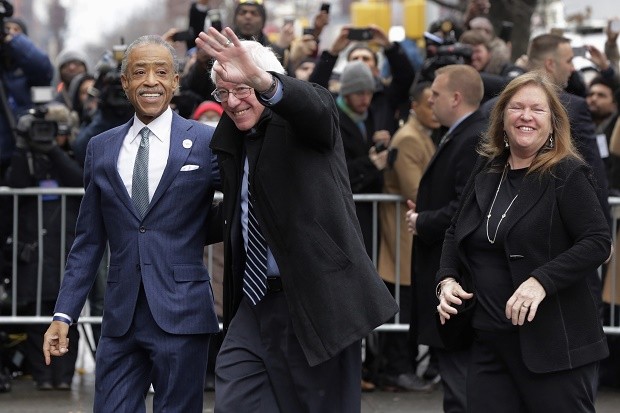
The Rev. Al Sharpton, left, escorts Democratic presidential candidate Sen. Bernie Sanders, I-Vt. and his wife, Jane O’Meara Sanders, as they arrive for a breakfast meeting at Sylvia’s Restaurant, Wednesday, Feb. 10, 2016, in the Harlem neighborhood of New York. Sanders defeated former Secretary of State Hillary Clinton on Tuesday in the New Hampshire primary. AP
COLUMBIA, South Carolina — Democratic presidential candidates Hillary Clinton and Bernie Sanders debated again Thursday night as the focus turned to minority voters influential in contests later this month in South Carolina and Nevada.
Clinton’s loss to Sanders in the New Hampshire primary by 22 percentage points was especially painful because she lost with women, her presumed base of support as she tries to become the country’s first female president.
With Nevada next, Sanders now faces a test of how he does with non-white voters after the largely white states of Iowa and New Hampshire. Nevada is 28 percent Latino, 9 percent African-American and 8 percent Asian-American.
READ: Sanders routs Clinton, Trump beats rivals in New Hampshire
The Vermont senator’s message of economic and social inequality, systemic racism and unlimited money in politics is aimed at Americans who feel the system is stacked against them.
Clinton has acknowledged she has “work to do” to introduce herself to young women and new voters. She is expected to attack Sanders more aggressively on issues that matter to minority voters, defending policies like the health care law achieved by President Barack Obama, the nation’s first black president.
On Thursday, the political action committee of the Congressional Black Caucus endorsed Clinton. The committee is separate from the Congressional Black Caucus, not all of whom have endorsed Clinton.
Sanders was expected to talk at length about the civil rights activism of his youth, his recent outreach to prominent black figures and parts of his agenda that might most resonate with black and Hispanic communities. He had breakfast with civil rights leader the Rev. Al Sharpton on Wednesday.
Civil rights leader John Lewis on Thursday dismissed Sanders’ claims of his 1960s work on racial equality, saying, “I never saw him. I never met him.” On his campaign website, Sanders says he has a “long history of fighting for social equality and the rights of black Americans — a record that goes back to the early 1960s.”
If Clinton solidifies her support among black voters over the next month, she could amass a significant number of delegates in the push toward the 2,382 needed to win the party nomination. There are more than 1,400 delegates at stake in states such as South Carolina, Georgia, Alabama, Tennessee and Louisiana.
In the more crowded Republican field, South Carolina is next. Billionaire Donald Trump, fresh from a commanding win in New Hampshire, will be tested by the state’s more conservative voters.
A group of Latino celebrities condemned Trump and his Republican presidential rivals, saying Trump speaks for the party’s anti-immigrant, anti-Latino agenda.
The group including actress America Ferrera, comedian George Lopez and legendary musician Carlos Santana is urging the nation’s 55 million Latinos to “vote for candidates who support our community.” It did not endorse either Clinton or Sanders.
Almost all the Republicans have spent months building complex campaigns in South Carolina. After that primary on Feb. 20, seven Southern states including Georgia and Virginia will anchor the Super Tuesday primaries on March 1.
Trump was leading in South Carolina among all demographic groups, an NBC/Marist/Wall Street Journal poll showed, with Cruz and Florida Sen. Marco Rubio a distant second and third.
READ: Hillary Clinton’s lifelong ambition: presidency